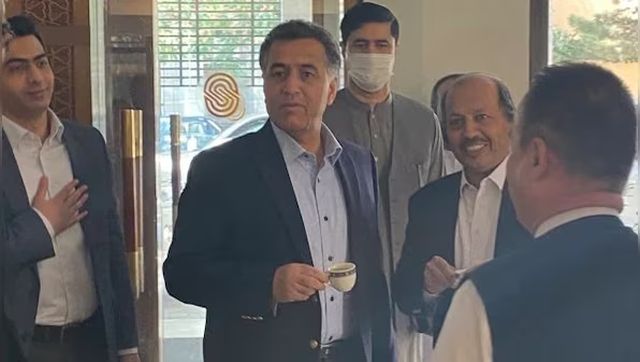It is unprecedented. But it has happened. Pakistan’s military arrested its former chief of Inter-Services Intelligence (ISI) Lt Gen Faiz Hameed (retired) and has initiated court martial proceedings against him.
The military said Hameed, who headed the Inter-Services Intelligence agency, is charged with violating the terms of his retirement from the armed forces and faces additional charges over his involvement in a land development issue.
“Complying with the orders of Supreme Court of Pakistan… the process of Field General Court Martial has been initiated and Lt Gen Faiz Hameed (Retd) has been taken into military custody,” the army said.
Hameed’s arrest is the first time in Pakistan’s history that a current or former chief of the powerful ISI has faced court-martial proceedings. Many note that it is part of a crackdown on the allies of imprisoned former Prime Minister Imran Khan.
But who exactly is Faiz Hameed? What has he been accused of?
Who is Faiz Hameed?
Lt General Faiz Hameed (retired) led Pakistan’s powerful ISI from 2019 to 2021 and was a key figure in the country’s security apparatus. He had climbed to the top and had replaced General Asim Munir, who is incidentally the current Pakistan Army chief. Hameed’s ascent to the top had taken place under then Prime Minister Imran Khan’s regime.
Before his ISI stint, Hameed first gained importance in 2017 when he played a key role in resolving the Faizabad dharna led by Tehreek-i-Labbaik Pakistan through a negotiated settlement.
In 2021, he shot to international fame when visuals of him emerged drinking tea with the Taliban in Kabul’s Serena Hotel shortly after the group took over Afghanistan in August 2021. Many at the time had noted that this was an indication of Pakistan’s support to the group, which was battling against the United States and its allies.
During his tenure as ISI chief, many politicians have accused Hameed of being heavy-handed to please his political bosses and further his career, reports the New York Times. Former Prime Minister Nawaz Sharif publicly claimed that General Hameed, along with a group of Supreme Court judges and another military general, was behind his removal from power in 2017.
In November 2022, four months before his scheduled retirement, Hameed was forced to resign after General Munir took over as the Pakistan army chief. At the time of his exit, Imran Khan had tried to retain him, but to no avail — highlighting the tensions between Khan and the Pakistani army.
Apart from the current matter, Hameed has also been accused by Pakistan’s former minister, Faisal Vawda, in May 2023, of being the “architect, mastermind, and biggest beneficiary” of the Al-Qadir Trust case, under which it has been alleged that former prime minister Imran Khan and his wife illegally obtained billions of Pakistani Rupees and land worth hundreds of kanals from Bahria Town Ltd.
What led to Hameed’s arrest?
Hameed’s arrest and subsequent court martial is connected to a housing scheme scandal, called the Top City case.
The case became headlines when Moeez Ahmed Khan, the owner of the Top City housing development, filed a petition in Pakistan’s supreme court, alleging that at the behest of Hameed, the ISI had raided his office and residence. During the raids, valuables, gold, diamonds and cash had been seized with Khan further alleging that Hameed extorted from Rs 4 crore from him.
In response to these allegations, Pakistan’s court had ordered the Ministry of Defence to investigate, saying the allegations against Hameed were of an “extremely serious nature”, and “cannot be left unattended” because, if they were proven to be true, they would undermine the reputation of Pakistan’s institutions, including the country’s federal government, armed forces, ISI, and Pakistan Rangers.
In
Aprilthe army formed a committee to investigate the allegations of misuse of authority against Hameed.
On Monday (August 12), the Pakistan army’s Inter-Services Public Relations (ISPR) department in a statement said that the investigation had been carried out and Hameed had been taken into military custody.
“Complying with the orders of Supreme Court of Pakistan, a detailed court of inquiry was undertaken by Pakistan Army, to ascertain correctness of complaints in Top City case made against Lt Gen Faiz Hameed (Retd).
It added: “Consequently, appropriate disciplinary action has been initiated against Lt Gen Faiz Hameed (retd), under provisions of Pakistan Army Act.”
The ISPR further said: “In addition, multiple instances of violation of Pakistan Army Act post-retirement have also been established. The process of Field General Court Martial has been initiated and Lt Gen Faiz Hameed (retd) has been taken into military custody.”
What are the takeaway from Hameed’s arrest?
Hameed’s arrest in Pakistan is unprecedented. Husain Haqqani, a former ambassador of Pakistan to the US and now a senior fellow at the Hudson Institute in Washington, was quoted as telling the New York Times, “The arrest and possible trial of a former spy chief is unusual for Pakistan.”
Michael Kugelman, a fellow at the Wilson Centre in Washington DC, also told The Financial Times, “The military looks to be making an example of Hameed, showing that it takes accountability seriously, even when it comes to one of its own.
“Sending this message to Pakistanis these days is strategic, as it’s a moment when anti-army sentiment runs high within the public.”
For many others, Hameed’s arrest is also a warning to former Prime Minister Imran Khan. The two of them shared close ties, with many noting that even after the former’s retirement he provided support and advice to Khan.
“It is, of course, aimed at Imran Khan and his political party, who have greatly benefited from General Hameed before and after his retirement,” Murtaza Solangi, a former information minister and political analyst, told the New York Times.
“But more than that, it is a clear and powerful message from the emboldened and strengthened Army Chief General Syed Asim Munir to both serving and retired personnel that any attempt to weaken and divide the military will not be tolerated,” Solangi added.
With inputs from agencies




























































